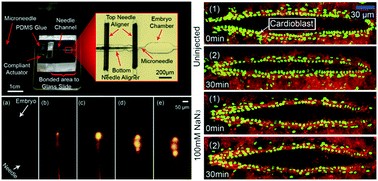Our official English website, www.x-mol.net, welcomes your
feedback! (Note: you will need to create a separate account there.)
A microfluidic microinjector for toxicological and developmental studies in Drosophila embryos
Lab on a Chip ( IF 6.1 ) Pub Date : 2017-10-16 00:00:00 , DOI: 10.1039/c7lc00537g Reza Ghaemi 1, 2, 3, 4 , Pouya Arefi 2, 3, 4, 5 , Ana Stosic 2, 3, 4, 5 , Meryl Acker 2, 3, 4, 5 , Qanber Raza 2, 3, 4, 5 , J. Roger Jacobs 2, 3, 4, 5 , Ponnambalam Ravi Selvaganapathy 1, 2, 3, 4
Lab on a Chip ( IF 6.1 ) Pub Date : 2017-10-16 00:00:00 , DOI: 10.1039/c7lc00537g Reza Ghaemi 1, 2, 3, 4 , Pouya Arefi 2, 3, 4, 5 , Ana Stosic 2, 3, 4, 5 , Meryl Acker 2, 3, 4, 5 , Qanber Raza 2, 3, 4, 5 , J. Roger Jacobs 2, 3, 4, 5 , Ponnambalam Ravi Selvaganapathy 1, 2, 3, 4
Affiliation

|
Microinjection is an established and reliable method to deliver biological reagents such as transgenic constructs and drugs, to specific locations inside organisms such as the Drosophila embryo and C. elegans worm. In this paper, a simple compliant mechanism based PDMS-microinjection system has been demonstrated. Unlike conventional microinjectors, this unique system could allow one to precisely insert a long taper microneedle laterally and at various positions inside the length of the Drosophila embryo (up to 250 μm) with the resolution of 5 μm. Volumes as low as 30 pL with accuracy of ±10 pL were delivered inside the embryo via pressure pulses. The device has been used to study the effect of toxins on cardiogenesis in Drosophila embryos. Using this device, we demonstrate that the cardioblast (CB) migration velocity is modified in a dose sensitive manner to varying doses of injected sodium azide (NaN3) and, for the first time, quantify the effect of the toxin on heart assembly. Injection with 40 pL of NaN3 was shown to decrease CB migration velocity and filopodia number at concentrations above 10 mM, while embryos injected with the tracer Rhodamine B (0 mM NaN3) displayed no significant difference when compared to uninjected embryos. This device can be potentially used for other embryonic assays, which require accurate delivery of the reagents to a specific location within the embryo.
中文翻译:

一种用于果蝇胚胎毒理学和发育研究的微流控显微注射器
显微注射是一种建立可靠的方法,可以将生物试剂(例如转基因构建体和药物)输送到果蝇胚胎和秀丽隐杆线虫等生物体内的特定位置。在本文中,已经证明了一种基于PDMS显微注射系统的简单顺应性机制。与传统的微型注射器不同,这种独特的系统可以使一个长锥形微针精确地横向插入到果蝇胚胎长度内(最大250μm)的不同位置,分辨率为5μm。通过压力脉冲将低至30 pL的体积(精度为±10 pL)输送到胚胎内部。该设备已被用于研究毒素对大鼠心脏发生的影响。果蝇胚胎。使用该设备,我们证明了成心细胞(CB)的迁移速度以剂量敏感的方式被改变,以适应不同剂量的叠氮化钠(NaN 3)的注射,并且首次量化了毒素对心脏组装的影响。在高于10 mM的浓度下注射40 pL NaN 3会降低CB迁移速度和丝状伪足数,而与示踪剂若丹明B(0 mM NaN 3)注射的胚胎相比未注射的胚胎则没有显着差异。该设备可以潜在地用于其他胚胎化验,这需要将试剂准确地递送到胚胎内的特定位置。
更新日期:2017-11-07
中文翻译:

一种用于果蝇胚胎毒理学和发育研究的微流控显微注射器
显微注射是一种建立可靠的方法,可以将生物试剂(例如转基因构建体和药物)输送到果蝇胚胎和秀丽隐杆线虫等生物体内的特定位置。在本文中,已经证明了一种基于PDMS显微注射系统的简单顺应性机制。与传统的微型注射器不同,这种独特的系统可以使一个长锥形微针精确地横向插入到果蝇胚胎长度内(最大250μm)的不同位置,分辨率为5μm。通过压力脉冲将低至30 pL的体积(精度为±10 pL)输送到胚胎内部。该设备已被用于研究毒素对大鼠心脏发生的影响。果蝇胚胎。使用该设备,我们证明了成心细胞(CB)的迁移速度以剂量敏感的方式被改变,以适应不同剂量的叠氮化钠(NaN 3)的注射,并且首次量化了毒素对心脏组装的影响。在高于10 mM的浓度下注射40 pL NaN 3会降低CB迁移速度和丝状伪足数,而与示踪剂若丹明B(0 mM NaN 3)注射的胚胎相比未注射的胚胎则没有显着差异。该设备可以潜在地用于其他胚胎化验,这需要将试剂准确地递送到胚胎内的特定位置。











































 京公网安备 11010802027423号
京公网安备 11010802027423号